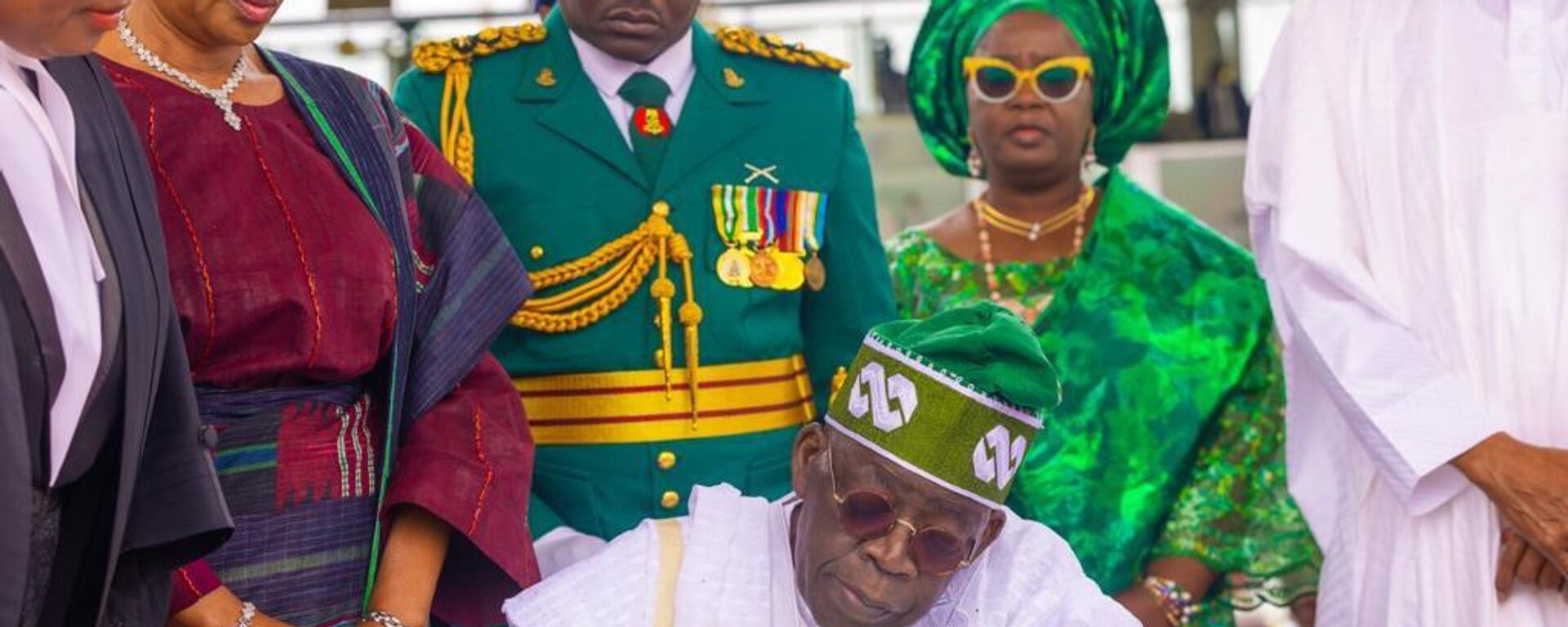https://en.sputniknews.africa/20230708/nigerias-president-tinubu-forms-tax-reform-committee-to-strengthen-revenue-generation-1060423352.html
Nigeria's President Tinubu Forms Tax Reform Committee to Strengthen Revenue Generation
Nigeria's President Tinubu Forms Tax Reform Committee to Strengthen Revenue Generation
Sputnik Africa
Nigeria's public debt has increased by seven times since 2015, reaching approximately 77 trillion Nigerian naira ($100 billion), according to the country's... 08.07.2023, Sputnik Africa
2023-07-08T19:00+0200
2023-07-08T19:00+0200
2023-08-03T10:44+0200
sub-saharan africa
west africa
nigeria
economic growth
reforms
bola tinubu
economy
https://cdn1.img.sputniknews.africa/img/07e7/07/08/1060424153_0:28:1785:1032_1920x0_80_0_0_296639cfe2d1b912e2e7058f32cad396.jpg
Nigerian President Bola Ahmed Tinubu has formed a committee with the aim of revitalizing the country's tax laws and fiscal policy in order to boost revenue and reduce the need for borrowing.The committee will be chaired by Mr. Taiwo Oyedele, the Fiscal Policy Partner and Africa Tax Leader at PricewaterhouseCoopers.This development came just 24 hours after the President signed four Executive Orders, suspending the five percent excise tax on telecommunication services and the escalation of excise duties on locally-manufactured vehicles.The committee "Will comprise experts from both the private and public sectors and have responsibility for the various aspects of tax law reform, fiscal policy design and coordination, harmonisation of taxes, and revenue administration," the statement read. The government's goal is to transform the tax system to support sustainable development and achieve a minimum tax-to-GDP ratio of 18 percent within the next three years.Due to low revenue collections, Nigeria, which is Africa's largest economy and oil producer, has heavily relied on borrowing to meet public expenditure needs, jeopardizing efforts to manage debt and fund infrastructure, education, and health projects.Nigeria's public debt has increased by seven times since 2015, reaching approximately 77 trillion Nigerian naira ($100 billion), according to the country's Debt Management Office. The servicing of these obligations has consumed 96 percent of government revenue in 2022 alone.The establishment of this committee follows Tinubu's decision to suspend excise taxes on telecommunications services and certain locally produced goods, introduced two months ago to alleviate business costs.Since taking office on May 29, Tinubu has been focused on rejuvenating the nation's economy, which has experienced a decade of stagnation. His initiatives have included abolishing a fuel subsidy that amounted to $10 billion in 2022, replacing a controversial central bank governor, easing foreign exchange controls, and initiating a transformation of Nigeria's chronically inadequate power industry.
https://en.sputniknews.africa/20230616/nigerias-tinubu-appoints-special-advisors-to-push-reforms-1059970550.html
west africa
nigeria
Sputnik Africa
feedback@sputniknews.com
+74956456601
MIA „Rossiya Segodnya“
2023
Sputnik Africa
feedback@sputniknews.com
+74956456601
MIA „Rossiya Segodnya“
News
en_EN
Sputnik Africa
feedback@sputniknews.com
+74956456601
MIA „Rossiya Segodnya“
Sputnik Africa
feedback@sputniknews.com
+74956456601
MIA „Rossiya Segodnya“
west africa, nigeria, economic growth, reforms, bola tinubu, economy
west africa, nigeria, economic growth, reforms, bola tinubu, economy
Nigeria's President Tinubu Forms Tax Reform Committee to Strengthen Revenue Generation
19:00 08.07.2023 (Updated: 10:44 03.08.2023) Nigeria's public debt has increased by seven times since 2015, reaching approximately 77 trillion Nigerian naira ($100 billion), according to the country's Debt Management Office. The servicing of these obligations has consumed 96 percent of government revenue in 2022 alone.
Nigerian President Bola Ahmed Tinubu has formed a committee with the aim of revitalizing the country's tax laws and fiscal policy in order to
boost revenue and reduce the need for borrowing.
The committee will be chaired by Mr. Taiwo Oyedele, the Fiscal Policy Partner and Africa Tax Leader at PricewaterhouseCoopers.
This development came just 24 hours after the President signed four Executive Orders, suspending the five percent excise tax on telecommunication services and the escalation of excise duties on locally-manufactured vehicles.
"The committee's primary objective is to enhance revenue collection efficiency, ensure transparent reporting, and promote the effective utilization of tax and other revenues to boost citizens' tax morale, foster a healthy tax culture, and drive voluntary compliance," the president’s media office said in a statement on Friday.
The committee "Will comprise experts from both the private and public sectors and have responsibility for the various aspects of tax law reform, fiscal policy design and
coordination, harmonisation of taxes, and revenue administration," the statement read.
The government's goal is to transform the tax system to support sustainable development and achieve a minimum tax-to-GDP ratio of 18 percent within the next three years.
Due to low revenue collections, Nigeria, which is Africa's largest economy and oil producer, has heavily relied on borrowing to meet public expenditure needs, jeopardizing efforts to manage debt and fund infrastructure, education, and health projects.
Nigeria's public debt has increased by seven times since 2015, reaching approximately 77 trillion Nigerian naira ($100 billion), according to the country's Debt Management Office. The servicing of these obligations has
consumed 96 percent of government revenue in 2022 alone.
The tax reforms are expected to not only enhance Nigeria's revenue profile but also create a more favorable business environment that is globally competitive, according to Adelabu Adedeji, the Special Adviser to the President on Revenue.
The establishment of this committee follows Tinubu's decision to suspend excise taxes on telecommunications services and certain locally produced goods, introduced two months ago to alleviate business costs.
Since taking office on May 29, Tinubu has been
focused on rejuvenating the nation's economy, which has experienced a decade of stagnation. His initiatives have included abolishing a fuel subsidy that amounted to $10 billion in 2022, replacing a controversial central bank governor, easing foreign exchange controls, and initiating a transformation of Nigeria's chronically inadequate power industry.


